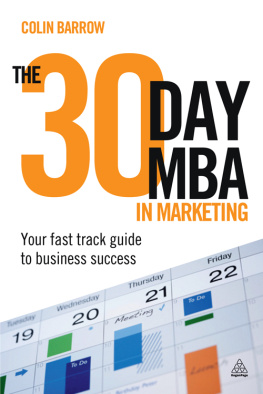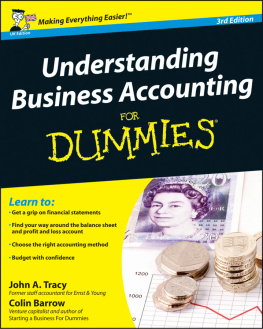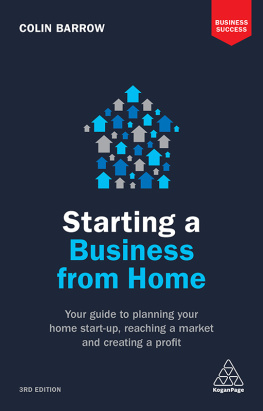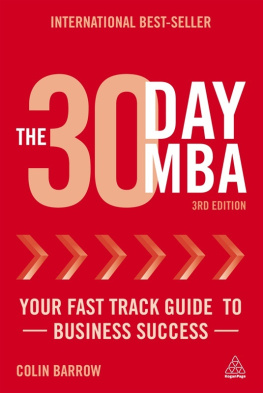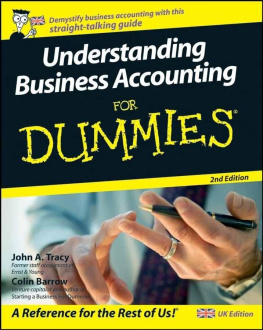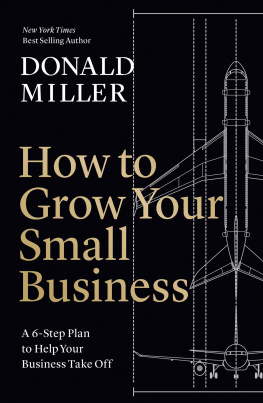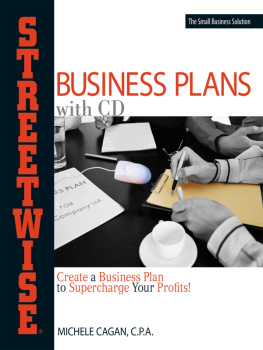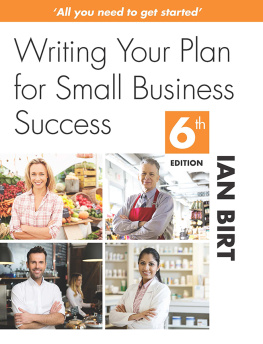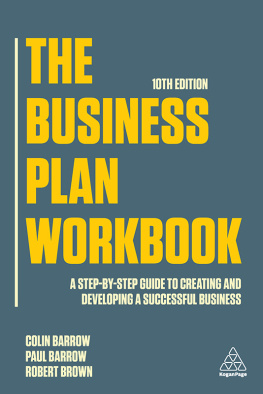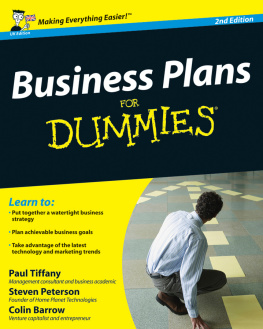The Business Plan Workbook
Ninth Edition
The Business Plan Workbook
A step-by-step guide to creating and developing a successful business
Colin Barrow, Paul Barrow and Robert Brown

Publishers note
Every possible effort has been made to ensure that the information contained in this book is accurate at the time of going to press, and the publishers and authors cannot accept responsibility for any errors or omissions, however caused. No responsibility for loss or damage occasioned to any person acting, or refraining from action, as a result of the material in this publication can be accepted by the editor, the publisher or the author.
First published in Great Britain and the United States in 2018 by Kogan Page Limited
Apart from any fair dealing for the purposes of research or private study, or criticism or review, as permitted under the Copyright, Designs and Patents Act 1988, this publication may only be reproduced, stored or transmitted, in any form or by any means, with the prior permission in writing of the publishers, or in the case of reprographic reproduction in accordance with the terms and licences issued by the CLA. Enquiries concerning reproduction outside these terms should be sent to the publishers at the undermentioned addresses:
2nd Floor, 45 Gee Street
London
EC1V 3RS
United Kingdom
c/o Martin P Hill Consulting
122 W 27th Street
New York, NY 10001
USA
4737/23 Ansari Road
Daryaganj
New Delhi 110002
India
Colin Barrow, Paul Barrow and Robert Brown 2018
The right of Colin Barrow, Paul Barrow and Robert Brown to be identified as the authors of this work has been asserted by them in accordance with the Copyright, Designs and Patents Act 1988.
ISBN 978 0 7494 8179 7
E-ISBN 978 0 7494 8180 3
Typeset by Integra Software Services, Pondicherry
Print production managed by Jellyfish
Printed and bound in Great Britain by CPI Group (UK) Ltd, Croydon CR0 4YY
CONTENTS
List of Figures
List of Tables
In this workbook we have distilled the knowledge and experience of the faculty at Cranfield School of Management and other world-renowned business schools in teaching the many thousands of students, business executives, entrepreneurs, public sector managers and those charged with running charitable, not-for-profit and social enterprises, who have taken part in enterprise programmes. Entrepreneurs who have prepared business plans on programmes at Cranfield include: Lord Bilimoria (Cobra Beer), Nick Jenkins (Moonpig), Sarah Willingham (Lets Save Some Money), Mark Butler (PCL Ceramics Limited, recipient of the 2013 Queens Award for Enterprise for outstanding performance in International Trade), Deepak Kuntawala (DVK Deepak, named Global Entrepreneur of the Year 2013 at the TiE UK Awards The Indus Entrepreneurs is the worlds largest not for profit dedicated to supporting and fostering entrepreneurship) and Kenneth White (Frosts Ltd, listed as one of the 1,000 companies to Inspire Britain by the London Stock Exchange Group). Big business too has played its part in adding to Cranfields business planning experience. John McFarlane, Chairman, Barclays PLC and Warren East CEO at Rolls-Royce are amongst the schools distinguished alumni.
Business planning is at the core of organizational and business strategy and is the essential precursor whether you are starting a new business, expanding an existing one, gaining approval for funding for a project, securing a grant or even entering a competition such as Dragons Den. Over the years we have developed and tested this method of helping people to research and validate their proposals, and then to write up a business plan themselves.
Towards the end of each programme we invite a distinguished panel of senior bankers, venture capital providers and others involved in appraising proposals for external support of various kinds to review and criticize each business plan presentation. Their valued comments not only have spurred our programme participants to greater heights, but have given the faculty at Cranfield a privileged insight into the minds and thought processes of the principal providers of capital for new and growing enterprises.
This workbook brings together the processes and procedures required by the relative novice to write a business plan. Also included throughout are examples from the business plans of entrepreneurs and others who for the most part have gone on to start up successful enterprises.
In addition, we have included criticisms, warnings, and the experiences of backers, investors and of recently successful entrepreneurs when they have a direct bearing on writing and presenting a business plan.
We dont pretend to have made writing up business plans an easy task but we do think we have made it an understandable one that is within the grasp of everyone with the determination to succeed.
Thousands of students have passed through Cranfields business planning programmes going on to make their mark in business, charities and the public sector in this country and around the world.
The workbook contains 29 assignments that, once completed, should ensure that you have all the information you need to write and present a successful business plan. That is, one that helps to accomplish your objective, whether it is to gain a greater understanding of the venture you are proposing to start and its viability, to raise outside money or gain support for your proposals from senior levels of management. Throughout the book the term entrepreneur has been used interchangeably with innovator, manager, champion and similar terms used in a wide range of organizations in both the profit and not-for-profit sectors. The definition of entrepreneur used is that of someone who shifts resources from a low to a higher level of value added; this is the defining characteristic of almost everyone who writes a business plan regardless of the nature of their organization, actual or prospective.
The workbook does not set out to be a comprehensive textbook on every business and management subject finance, marketing, law, etc. Rather, it gives an appreciation as to how these subjects should be used to prepare your business plan. The topics covered under each assignment will often pull together ingredients from different academic disciplines. For example, elements of law and marketing will be assembled in the assignment in which you are asked to describe your service or product and its proprietary position (patents, copyright, design registration, etc).
For some of the assignments you will almost certainly need to research outside the material contained in this workbook. However, technical explanations of such subjects as cash flow, market research questionnaire design and break-even analysis are included.
The assignments are contained in seven phases that, as well as having a practical logic to their sequence, will provide you with manageable chunks either to carry out yourself at different times, or to delegate to partners and professional advisers. While it is useful to make use of as much help as you can get in preparing the groundwork, you should orchestrate the information and write up the business plan yourself. After all, it is your future that is at stake and every prospective financier will be backing you and your ability to put this plan into action, not your scriptwriter.


